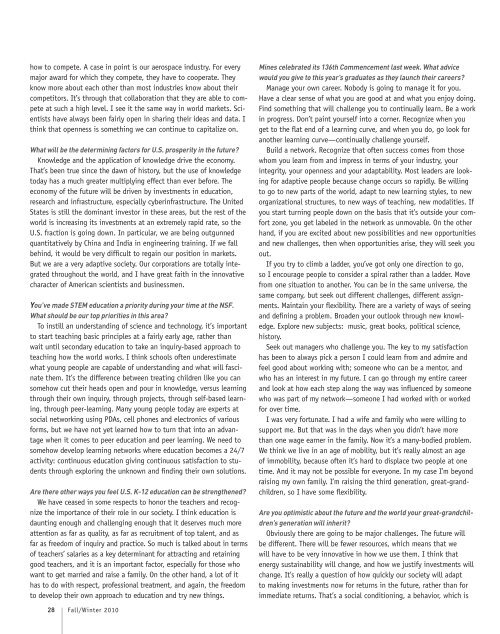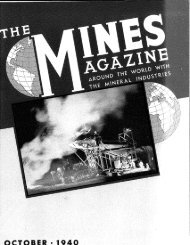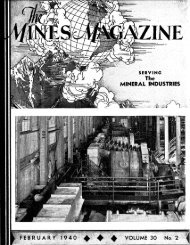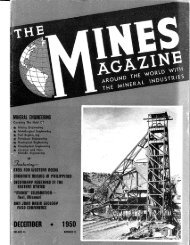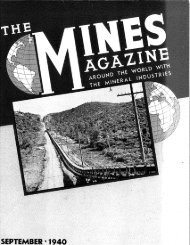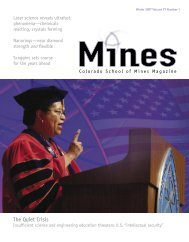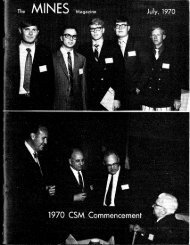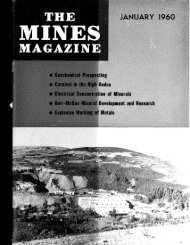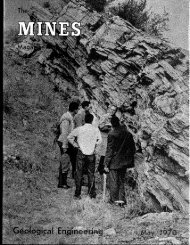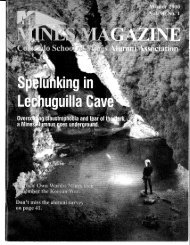Mines Magazine Turns 100 - the Timothy and Bernadette Marquez ...
Mines Magazine Turns 100 - the Timothy and Bernadette Marquez ...
Mines Magazine Turns 100 - the Timothy and Bernadette Marquez ...
- No tags were found...
Create successful ePaper yourself
Turn your PDF publications into a flip-book with our unique Google optimized e-Paper software.
how to compete. A case in point is our aerospace industry. For everymajor award for which <strong>the</strong>y compete, <strong>the</strong>y have to cooperate. Theyknow more about each o<strong>the</strong>r than most industries know about <strong>the</strong>ircompetitors. It’s through that collaboration that <strong>the</strong>y are able to competeat such a high level. I see it <strong>the</strong> same way in world markets. Scientistshave always been fairly open in sharing <strong>the</strong>ir ideas <strong>and</strong> data. Ithink that openness is something we can continue to capitalize on.What will be <strong>the</strong> determining factors for U.S. prosperity in <strong>the</strong> future?Knowledge <strong>and</strong> <strong>the</strong> application of knowledge drive <strong>the</strong> economy.That’s been true since <strong>the</strong> dawn of history, but <strong>the</strong> use of knowledgetoday has a much greater multiplying effect than ever before. Theeconomy of <strong>the</strong> future will be driven by investments in education,research <strong>and</strong> infrastructure, especially cyberinfrastructure. The UnitedStates is still <strong>the</strong> dominant investor in <strong>the</strong>se areas, but <strong>the</strong> rest of <strong>the</strong>world is increasing its investments at an extremely rapid rate, so <strong>the</strong>U.S. fraction is going down. In particular, we are being outgunnedquantitatively by China <strong>and</strong> India in engineering training. If we fallbehind, it would be very difficult to regain our position in markets.But we are a very adaptive society. Our corporations are totally integratedthroughout <strong>the</strong> world, <strong>and</strong> I have great faith in <strong>the</strong> innovativecharacter of American scientists <strong>and</strong> businessmen.You’ve made STEM education a priority during your time at <strong>the</strong> NSF.What should be our top priorities in this area?To instill an underst<strong>and</strong>ing of science <strong>and</strong> technology, it’s importantto start teaching basic principles at a fairly early age, ra<strong>the</strong>r thanwait until secondary education to take an inquiry-based approach toteaching how <strong>the</strong> world works. I think schools often underestimatewhat young people are capable of underst<strong>and</strong>ing <strong>and</strong> what will fascinate<strong>the</strong>m. It’s <strong>the</strong> difference between treating children like you cansomehow cut <strong>the</strong>ir heads open <strong>and</strong> pour in knowledge, versus learningthrough <strong>the</strong>ir own inquiry, through projects, through self-based learning,through peer-learning. Many young people today are experts atsocial networking using PDAs, cell phones <strong>and</strong> electronics of variousforms, but we have not yet learned how to turn that into an advantagewhen it comes to peer education <strong>and</strong> peer learning. We need tosomehow develop learning networks where education becomes a 24/7activity: continuous education giving continuous satisfaction to studentsthrough exploring <strong>the</strong> unknown <strong>and</strong> finding <strong>the</strong>ir own solutions.Are <strong>the</strong>re o<strong>the</strong>r ways you feel U.S. K-12 education can be streng<strong>the</strong>ned?We have ceased in some respects to honor <strong>the</strong> teachers <strong>and</strong> recognize<strong>the</strong> importance of <strong>the</strong>ir role in our society. I think education isdaunting enough <strong>and</strong> challenging enough that it deserves much moreattention as far as quality, as far as recruitment of top talent, <strong>and</strong> asfar as freedom of inquiry <strong>and</strong> practice. So much is talked about in termsof teachers’ salaries as a key determinant for attracting <strong>and</strong> retaininggood teachers, <strong>and</strong> it is an important factor, especially for those whowant to get married <strong>and</strong> raise a family. On <strong>the</strong> o<strong>the</strong>r h<strong>and</strong>, a lot of ithas to do with respect, professional treatment, <strong>and</strong> again, <strong>the</strong> freedomto develop <strong>the</strong>ir own approach to education <strong>and</strong> try new things.<strong>Mines</strong> celebrated its 136th Commencement last week. What advicewould you give to this year’s graduates as <strong>the</strong>y launch <strong>the</strong>ir careers?Manage your own career. Nobody is going to manage it for you.Have a clear sense of what you are good at <strong>and</strong> what you enjoy doing.Find something that will challenge you to continually learn. Be a workin progress. Don’t paint yourself into a corner. Recognize when youget to <strong>the</strong> flat end of a learning curve, <strong>and</strong> when you do, go look forano<strong>the</strong>r learning curve—continually challenge yourself.Build a network. Recognize that often success comes from thosewhom you learn from <strong>and</strong> impress in terms of your industry, yourintegrity, your openness <strong>and</strong> your adaptability. Most leaders are lookingfor adaptive people because change occurs so rapidly. Be willingto go to new parts of <strong>the</strong> world, adapt to new learning styles, to neworganizational structures, to new ways of teaching, new modalities. Ifyou start turning people down on <strong>the</strong> basis that it’s outside your comfortzone, you get labeled in <strong>the</strong> network as unmovable. On <strong>the</strong> o<strong>the</strong>rh<strong>and</strong>, if you are excited about new possibilities <strong>and</strong> new opportunities<strong>and</strong> new challenges, <strong>the</strong>n when opportunities arise, <strong>the</strong>y will seek youout.If you try to climb a ladder, you’ve got only one direction to go,so I encourage people to consider a spiral ra<strong>the</strong>r than a ladder. Movefrom one situation to ano<strong>the</strong>r. You can be in <strong>the</strong> same universe, <strong>the</strong>same company, but seek out different challenges, different assignments.Maintain your flexibility. There are a variety of ways of seeing<strong>and</strong> defining a problem. Broaden your outlook through new knowledge.Explore new subjects: music, great books, political science,history.Seek out managers who challenge you. The key to my satisfactionhas been to always pick a person I could learn from <strong>and</strong> admire <strong>and</strong>feel good about working with; someone who can be a mentor, <strong>and</strong>who has an interest in my future. I can go through my entire career<strong>and</strong> look at how each step along <strong>the</strong> way was influenced by someonewho was part of my network—someone I had worked with or workedfor over time.I was very fortunate. I had a wife <strong>and</strong> family who were willing tosupport me. But that was in <strong>the</strong> days when you didn’t have morethan one wage earner in <strong>the</strong> family. Now it’s a many-bodied problem.We think we live in an age of mobility, but it’s really almost an ageof immobility, because often it’s hard to displace two people at onetime. And it may not be possible for everyone. In my case I’m beyondraising my own family. I’m raising <strong>the</strong> third generation, great-gr<strong>and</strong>children,so I have some flexibility.Are you optimistic about <strong>the</strong> future <strong>and</strong> <strong>the</strong> world your great-gr<strong>and</strong>children’sgeneration will inherit?Obviously <strong>the</strong>re are going to be major challenges. The future willbe different. There will be fewer resources, which means that wewill have to be very innovative in how we use <strong>the</strong>m. I think thatenergy sustainability will change, <strong>and</strong> how we justify investments willchange. It’s really a question of how quickly our society will adaptto making investments now for returns in <strong>the</strong> future, ra<strong>the</strong>r than forimmediate returns. That’s a social conditioning, a behavior, which is28 Fall/Winter 2010


